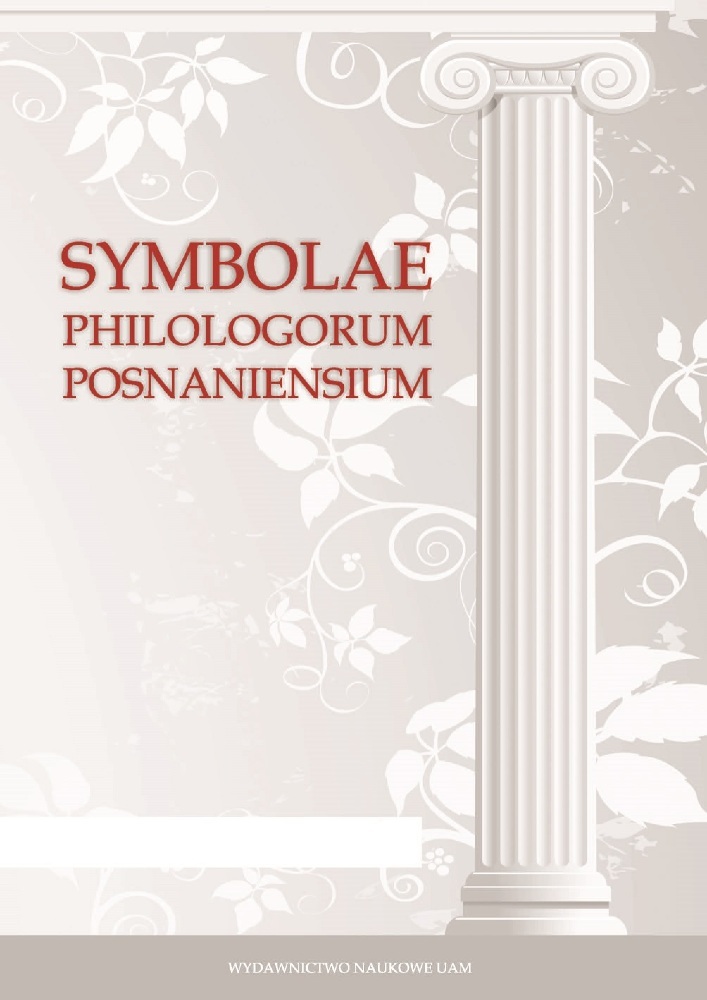Abstrakt
Ethnolinguistic approach allows to track cultural information included in language, especially lexical and phraseological units. From this perspective, the language tells us about the particular way a linguistic-cultural community perceives reality. Society attributes to women a number of features, qualities, defects and social functions. These traits shape a cultural image of women, and this biased picture is functional in social relationships and it is reflected on the terms a language uses to refer to women. The purpose of this paper is to describe the perception of old women in Roman society by means of the associations and connotations carried by Latin terms anus, anicula and vetula.Bibliografia
Binder 1861: W. Binder, Novus Thesaurus Adagiorum Latinorum. Lateinischer Sprichwörterschatz, Stuttgart 1861.
Brown 1991: P. Brown, “La antigüedad tardía”, [en:] P. Ariès & G. Duby (dirs.), Historia de la vida privada 1. Imperio romano y antigüedad tardía, Taurus 1991, pp. 229–304.
Cantarella 1991a: E. Cantarella, La calamidad ambigua. Condición e imagen de la mujer en la antigüedad griega y romana, trad. A. Pociña, Madrid 1991.
Cantarella 1991b: E. Cantarella, La mujer romana, Santiago de Compostela 1991.
Cantera Ortiz De Urbina 2005: J. Cantera Ortiz de Urbina, Diccionario Akal del Refranero latino, Madrid 2005.
Cavallero 1988: Pablo A. Cavallero: “Algo más sobre el motivo grecolatino de la vieja bebedora en Celestina: Rojas y la tradición de la comediografía”, [en:] Celestinesca, 12/2 (1988), pp. 5–16.
Conde Guerri 1979: E. Conde Guerri, La sociedad romana en Séneca, Murcia 1979.
De-Mauri 1995: L. De-Mauri, 5000 Proverbi e motti latini. Flores Sententiarum. Raccolta di sentenze, proverbi e motti latini di uso quotidiano, in ordine per materie, con le fonti indicate, schiarimenti e la traduzione italiana, Milán 1995 (2ª ed.).
Drae: Real Academia Española, Diccionario de la lengua española, versión en línea: http://www.rae.es/ [fecha de consulta: 15 de octubre de 2014]
Fatás Cabeza 2002: G. Fatás Cabeza, “Agua, sal, pan, vino y aceite en Roma”, [en:] Cuadernos de Aragón, 29 (2002), pp. 179–213.
Finley 1969: M. I. Finley, “The Silent Women of Rome”, [en:] Aspects of Antiquity. Discoveries and Controversies, London 1969.
Garate 1998: G. Garate, 27.173 Atsotitzak. Refranes. Proverbes. Proverbia, Bilbao 1998.
Hanssen 1953: J. S. Th. Hanssen, Latin Diminutives. A Semantic Study, Bergen 1953.
Herrero Llorente 1992: V.-J. Herrero Llorente, Diccionario de expresiones y frases latinas, Madrid 1992.
Lucy 1992: J. A. Lucy, Language Diversity and Thought. A Reformulation of the Linguistic Relativity Hypothesis, Cambridge 1992.
Martínez Del Castillo 2001: J.G. Martínez del Castillo, Benjamin Lee Whorf y el problema de la intelección, Almería 2001.
Martínez Kleiser 1953: L. Martínez Kleiser, Refranero general ideológico español, Madrid 1953.
Mcdonnell 1987: M. McDonnell, “The Speech of Numidicus at Gellius, N.A., 1.6”, American Journal of Philology, 108/1 (1987), pp. 81–98.
Mcdonnell 2006: M. McDonnell, Roman Mainliness. Virtus and the Roman Republic, Cambridge 2006.
Ogden & Richards 1984: Ch. K. Ogden & I. A. Richards, “El poder de las palabras”, [en:] El significado del significado. Una investigación acerca de la influencia del lenguaje sobre el
pensamiento y de la ciencia simbólica, trad. E. Pietro, Barcelona 1984, pp. 49–71.
Pascual López 2011: X. Pascual López, “La belleza femenina en las paremias españolas de origen grecolatino”, Estudios hispánicos, 19 (2011), pp. 115–125.
Peris 2001: A. Peris, Diccionari de locucions i frases llatines, Barcelona 2001.
Pomeroy 1995 [1975]: S. B. Pomeroy, Goddesses, Whores, Wives, and Slaves. Women in Classical Antiquity, New York 1995 (2ª ed).
Quintillà Zanuy 2006: M.ª T. Quintillà Zanuy, La dona a la llengua llatina. Descripció léxica i interpretació etnolingüística, Lleida 2006.
Rosivach 1994–1995: V.J. Rosivach, “Anus: Some Older Women in Latin Literature”, Classical World, 88 (1994–1995), pp. 107–117.
Sánchez Doncel 2003: G. Sánchez Doncel, Diccionario de latinismos y frases latinas, Madrid 2003.
Santoro L’hoir 2009: F. Santoro L’Hoir, “Muliebris Impotentia: The Paths to Power”, en: Tragedy, Rhetoric, and the Historiography of Tacitus’ Annales, Ann Arbor, MI 2009 (4ª ed.), pp. 111–157.
Saville-Troike 2003: M. Saville-Troike, The Ethnography of Communication. An Introduction, Malden–Oxford 2003 (3ª ed.).
Scheid 2006: J. Scheid, “«Extranjeras» indispensables. Las funciones religiosas de las mujeres en Roma”, en: P. Schmitt Pantel & R. Pastor (dirs.), Historia de las mujeres 1. La Antigüedad, trad. Marco A. Galmarini, Madrid 2006, pp. 445–487.
Sissa 2006: G. Sissa, “Filosofías del género: Platón, Aristóteles y la diferencia sexual”, en: P. Schmitt Pantel & R. Pastor (dirs.), Historia de las mujeres 1. La Antigüedad, trad. Marco A. Galmarini, Madrid 2006, pp. 89–134.
Suárez 2003: M.A. Suárez, “Nomen leaenaest: La construcción plautina de la anus en Curculio I 1–2”, Phaos, 3 (2003), pp. 119–128.
Thomas 1988: Y. Thomas, “Roma: padres ciudadanos y ciudad de los padres (siglo II a. C. - siglo II d. C.)”, [en:] A. Burguière, Ch. Klapisch-Zuber, M. Segalen & F. Zonabend (dirs.), Historia de la familia 1. Mundos lejanos, mundos antiguos, Madrid 1988, pp. 202–239.
Thomas 2006: Y. Thomas, “La división de los sexos en el derecho romano”, en: P. Schmitt Pantel & R. Pastor (dirs.), Historia de las mujeres 1. La Antigüedad, trad. Marco A. Galmarini, Madrid 2006, pp. 136–205.
Valentí 1990: E. Valentí, Aurea Dicta. Dichos y proverbios del mundo clásico, Barcelona 1990.
Whorf 1978 [1939]: B.L. Whorf, “The Relation of Habitual Thought and Behavior to Language”, en: L. Spier (ed.) (1941): Language, Culture, and Personality. Essays in Memory of Edward Sapir, Menasha 1941, pp. 75–93. Reproducido en: J.B. Carroll (ed.), Language, Thought and Reality. Selected Writings of Benjamin Lee Whorf, Cambridge, MA 1978, pp. 134–159.
Licencja
